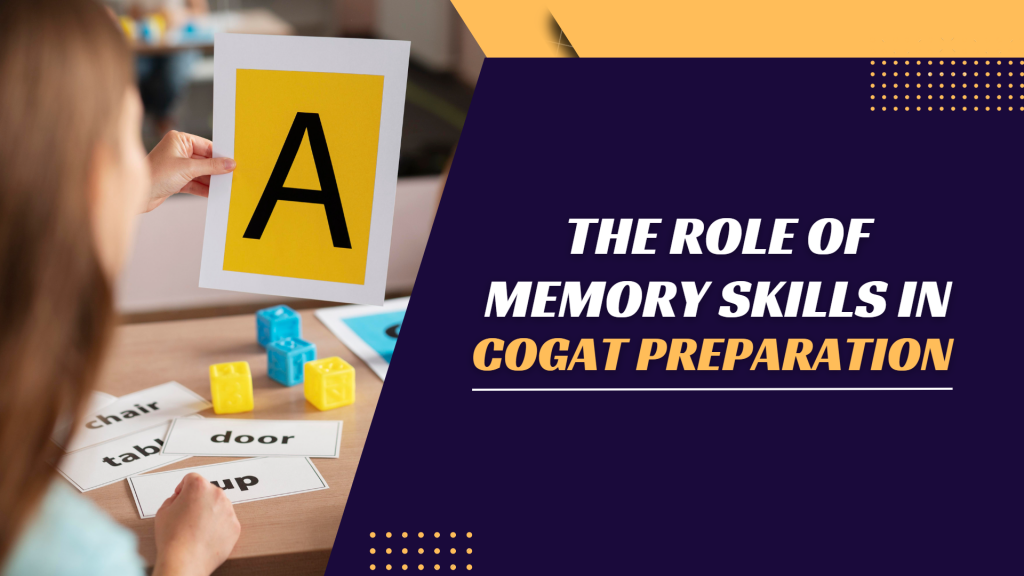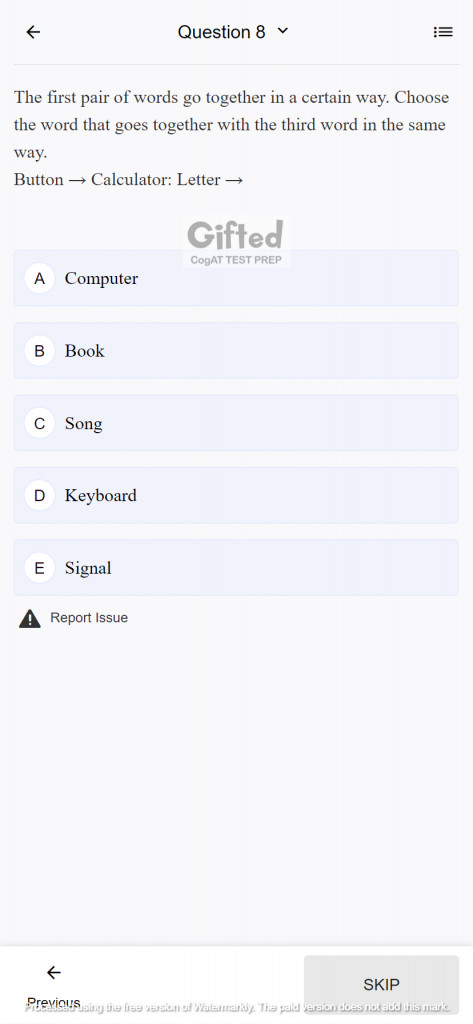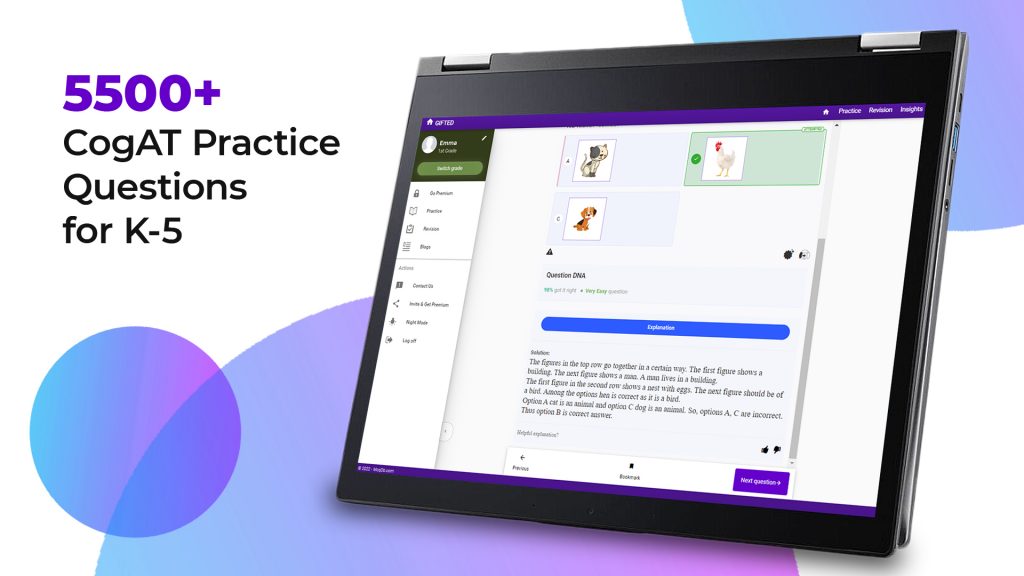Role of Memory Skills in CogAT® Test Preparation | Gifted App

When it comes to preparing for the CogAT, it’s vital to consider the impact of various cognitive skills on your child’s performance. One such skill that significantly influences CogAT preparation is memory. Memory skills play a crucial role in learning, retention, and information recall and are essential for success in all three CogAT batteries – verbal, quantitative, and nonverbal.
Memory skills not only contribute to better outcomes in the gifted and talented program but also foster critical thinking, problem-solving, and learning abilities. In this blog, we will explore the role of memory skills in CogAT preparation and provide practical tips to help your child enhance his/her memory abilities for optimal performance.
Understanding memory skills
Retention capacity is an essential cognitive ability that involves encoding, storing, and retrieving information efficiently. Memory is of different types, including working memory, short-term memory, and long-term memory. Working memory allows for the temporary holding and manipulation of information, while short-term memory retains information for a limited time. Long-term memory is responsible for storing information for an extended duration.
Importance of retention capabilities in CogAT preparation
1. Grasping and retention: Retention skills are crucial for understanding and retaining information presented in the gifted exam. By developing strong memory capabilities, your child can figure out the questions, retain relevant details, and recollect the necessary information to solve them effectively.
2. Recall of concepts and patterns: In the CogAT, your kid’s capacity to identify and utilize diverse ideas and structures are evaluated, and memory skills play a crucial role in recalling previously encountered concepts and ways. This enables the schoolgoer to establish connections, identify similarities, and effectively tackle unfamiliar problems.
3. Vocabulary and verbal reasoning: Vocabulary plays a crucial role in the verbal battery of the CogAT. Memory skills aid in learning and remembering new words, their meanings, and contextual usage. Additionally, memorization mastery supports verbal reasoning by facilitating the recall of relevant facts, analogies, and relationships between words.

4. Active retention and problem-solving: Strong immediate memory is essential for managing and mentally using multiple pieces of information. The CogAT often presents complex problems that require the integration of various details. Developing working memory will help your kiddo to better process and analyze information, leading to improved problem-solving abilities.
5. Long-term retention: High mnemonic capabilities lead to better long-term memory of learned concepts, ensuring that your child can recall and build upon foundational knowledge for future academic endeavors.
6. Analogical reasoning: Retention capacity assists in retrieving relevant analogies, facilitating your youngster’s ability to identify similarities and apply logical reasoning to solve problems.
7. Test-taking strategies: Being able to recall the examples and strategies is the most vital thing in the exam. Memory skills aid to do exactly the same thing to improve your minor’s performance during the time-limited CogAT.

Effective approaches to boost your child’s memory skills
- Encourage active learning: Engage your schoolgoer in interactive learning experiences rather than passive studying. Motivate him/her to summarize what has been learned, explain concepts, or create your own examples. This process of active engagement enhances memory consolidation and retrieval.
2. Utilize mnemonic devices: Introduce your child to mnemonic devices, such as acronyms, visual imagery, or rhymes. These techniques help him/her to link new information to existing knowledge, making it easier to remember and recall during the CogAT mock tests and the real exam.
3. Practice chunking: Teach your kiddo to break down complex information into smaller, more manageable chunks. By organizing information into meaningful groups or categories, it becomes easier for the child to remember and recall the information while solving problems.
4. Implement spaced repetition: Interval learning strengthens memory retention by reinforcing the learned material at the right times. Help your little master establish a study schedule that incorporates regular review sessions spaced over time. Make sure that the timetable is not too hectic for the child and gives him/her time for other leisure activities along with school and CogAT preparation. This way your little genius will enjoy the process instead of feeling it like a chore.
5. Make learning meaningful: Help your juvenile see the relevance and real-world application of the concepts he/she is learning. Relate the material to the interests, experiences, or future goals of your kid. This will enhance his/her motivation and aid in memory consolidation.
—
In the journey towards CogAT preparation, memory skills are often overlooked but in reality, they hold immense potential for your child’s exam success. Practice the techniques mentioned in the blog as they will help your little one to leverage his/her mental ability.
Apart from the above tips, make sure that your child spends a minimum of 2-3 hours every day practicing CogAT Questions from the Gifted Test Prep App. The has a complied Q-bank of 10,000+ CogAT practice questions from kindergarten to grade 5 so that your young master encounters every type of question asked in the gifted exam and is comfortable with it.
Cognitive Abilities Test™ (CogAT®) is a registered trademark of Riverside Assessments, LLC and its affiliates (“Riverside”). Riverside does not sponsor or endorse any Gifted.achieve.ai products or programs, nor has this gifted.achieve.ai product or program been reviewed, certified, or approved by Riverside. The questions used by gifted.achieve.ai are Gifted.achieve.ai’s own materials, created based on publicly available information, and in no way do they correspond to actual CogAT® testing materials. Gifted.achieve.ai uses practice materials only; not actual test questions. Trademarks referring to Riverside are used for nominative purposes only and such trademarks are solely the property of their respective owner.